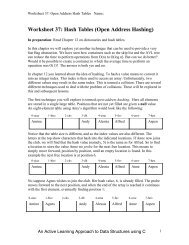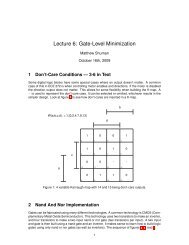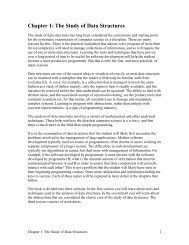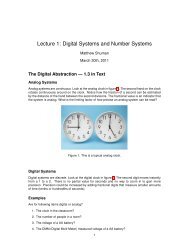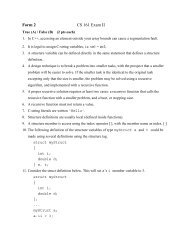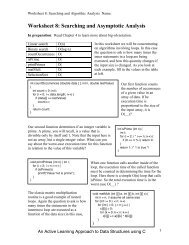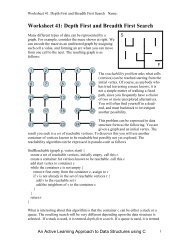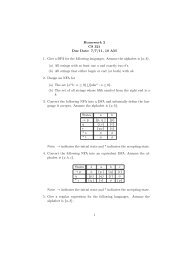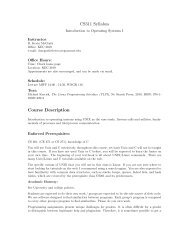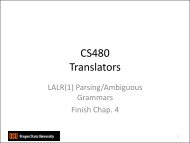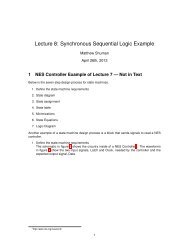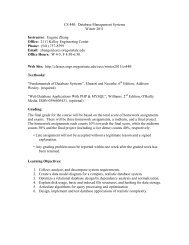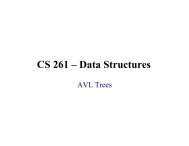Engineering Education and the Development of Expertise - Classes
Engineering Education and the Development of Expertise - Classes
Engineering Education and the Development of Expertise - Classes
Create successful ePaper yourself
Turn your PDF publications into a flip-book with our unique Google optimized e-Paper software.
100 (January 2011) 1 Journal <strong>of</strong> <strong>Engineering</strong> <strong>Education</strong><br />
Somerville, M., Anderson, D., Berbeco, H., Bourne, J. R., Crisman, J., Dabby, D., …<br />
Zastavker, Y. (2005). The Olin curriculum: Thinking toward <strong>the</strong> future. IEEE Transactions<br />
on <strong>Education</strong>, 48(1), 198–205.<br />
Springer, L., Stanne, M. E., & Donovan, S. S. (1999). Effects <strong>of</strong> small group learning on undergraduates<br />
in science, ma<strong>the</strong>matics, engineering, <strong>and</strong> technology: A meta-analysis. Review<br />
<strong>of</strong> <strong>Education</strong>al Research, 69(1), 21–51.<br />
Svensson, L. (1977). On qualitative differences in learning. III-Study skill <strong>and</strong> learning. British<br />
Journal <strong>of</strong> <strong>Education</strong>al Psychology, 47(pt. 3), 233–243.<br />
Traver, C., & Klein, J. D. (2010). Integration <strong>of</strong> engineering <strong>and</strong> <strong>the</strong> liberal arts: A two-way<br />
street. Proceedings <strong>of</strong> <strong>the</strong> American Society for <strong>Engineering</strong> <strong>Education</strong> Annual Conference <strong>and</strong><br />
Exposition, Louisville, KY. Retrieved from http://soa.asee.org/paper/conference/paperview.cfm?id=23182<br />
Trigwell, K., Prosser, M., & Waterhouse, F. (1999). Relations between teachers’ approaches to<br />
teaching <strong>and</strong> students’ approaches to learning. Higher <strong>Education</strong>, 37(1), 57–70.<br />
Tsang, E. (Ed.). (2007) Projects that matter: Concepts <strong>and</strong> models for service learning in engineering.<br />
American Association for Higher <strong>Education</strong>’s series on service learning in <strong>the</strong> disciplines. Sterling,<br />
VA:Stylus Publishing LLC<br />
Verleger, M. V., & Diefes-Dux, H. A. (2008). Impact <strong>of</strong> feedback <strong>and</strong> revision on student team<br />
solutions to model-eliciting activities. Proceedings <strong>of</strong> <strong>the</strong> American Society for <strong>Engineering</strong> <strong>Education</strong><br />
Annual Conference <strong>and</strong> Exposition, Pittsburgh, PA. Retrieved from<br />
http://soa.asee.org/paper/conference/paper-view.cfm?id=7807<br />
Vermunt, J. D. (1996). Metacognitive, cognitive <strong>and</strong> affective aspects <strong>of</strong> learning styles <strong>and</strong><br />
strategies: A phenomenographic analysis. Higher <strong>Education</strong>, 31(1), 25–50.<br />
Vermunt, J. D., & Vermetten, Y. J. (2004). Patterns in student learning: Relationships between<br />
learning strategies, conceptions <strong>of</strong> learning, <strong>and</strong> learning orientations. <strong>Education</strong>al Psychology<br />
Review, 16(4), 359–384.<br />
Volet, S., McGill, T., & Pears, H. (1995). Implementing process-based instruction in regular<br />
university teaching: Conceptual, methodological <strong>and</strong> practical issues. European Journal <strong>of</strong><br />
Psychology <strong>of</strong> <strong>Education</strong>, 10(4), 385–400.<br />
Walker, A., & Leary, H. (2009). A problem based learning meta analysis: Differences across<br />
problem types, implementation types, disciplines, <strong>and</strong> assessment levels, Interdisciplinary<br />
Journal <strong>of</strong> Problem-based Learning, 3(1), 12–43.<br />
Wallace, C. S., Tsoi, M. Y., Calkin, J., & Darley, M. (2002). Learning from inquiry-based laboratories<br />
in nonmajor biology: An interpretive study <strong>of</strong> <strong>the</strong> relationships among inquiry, experience,<br />
epistimologies, <strong>and</strong> conceptual growth. Journal <strong>of</strong> Research in Science Teaching,<br />
40(10), 986–1024.<br />
Wierstra, R. F. A., Kanselaarl, G., Van der Linden, J. L., Lodewijks, H. G. L. C., & Vermunt,<br />
J. D. (2003). The impact <strong>of</strong> <strong>the</strong> university context on European students’ learning approaches<br />
<strong>and</strong> learning environment preferences. Higher <strong>Education</strong>, 45(4), 503–523.<br />
Wiggins, G. T., & McTighe, J. (2005). Underst<strong>and</strong>ing by design. Alex<strong>and</strong>ria, VA: Association<br />
for Supervision <strong>and</strong> Curriculum <strong>Development</strong>.<br />
Woods, D. R., Hrymak, A. N., Marshall, R. R., Wood, P. E., Crowe, C. M., H<strong>of</strong>fman, T. W., …<br />
Bouchard, C. G. K. (1997). Developing problem-solving skills: The McMaster Problem Solving<br />
Program. Journal <strong>of</strong> <strong>Engineering</strong> <strong>Education</strong>, 86(2), 75–91.<br />
Zawojewski, J. S., Diefes-Dux, H., & Bowman, K. (Eds.). (2008). Models <strong>and</strong> modeling in engineering<br />
education: Designing experiences for all students. Rotterdam, <strong>the</strong> Ne<strong>the</strong>rl<strong>and</strong>s:<br />
Sense Publishers.<br />
149



